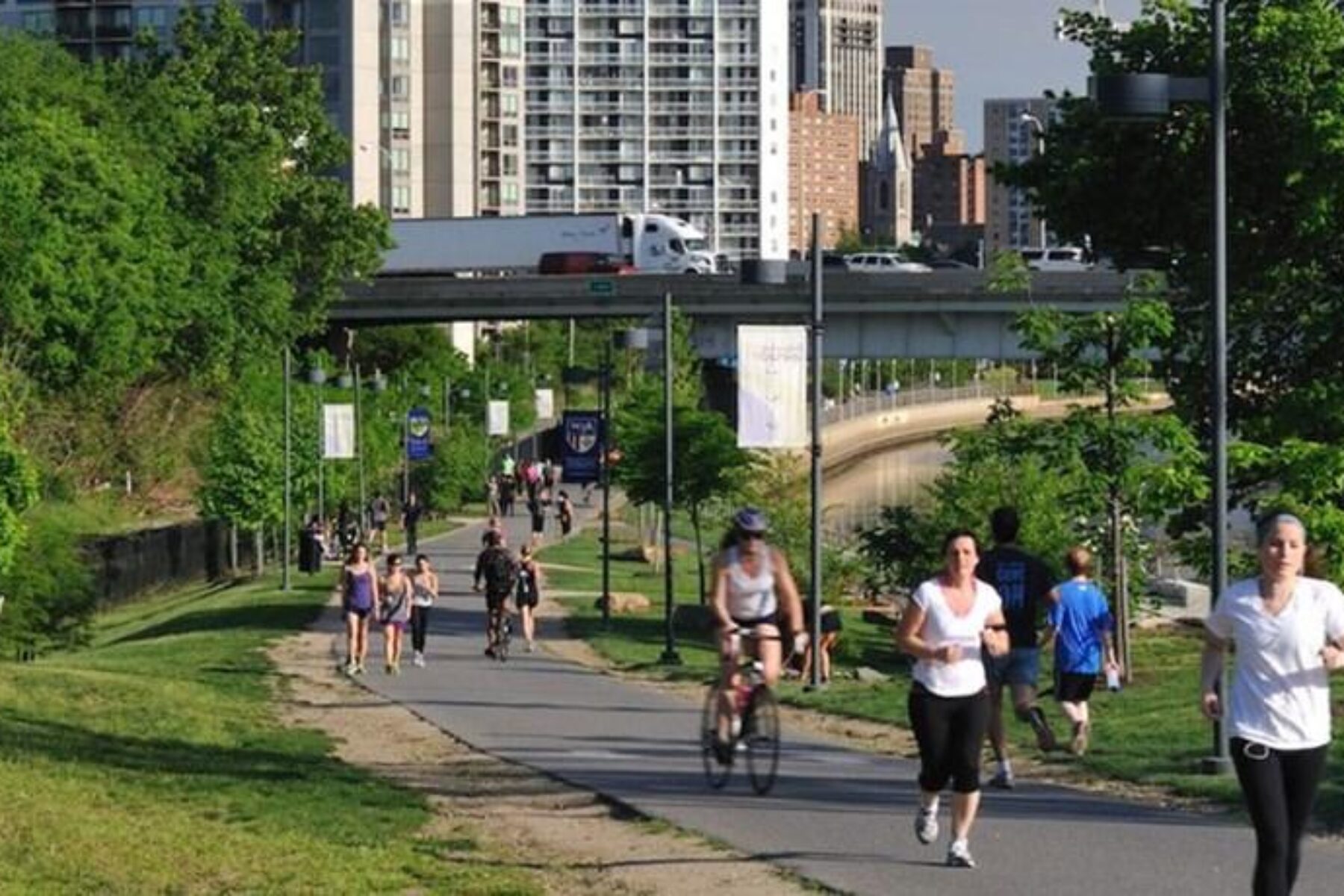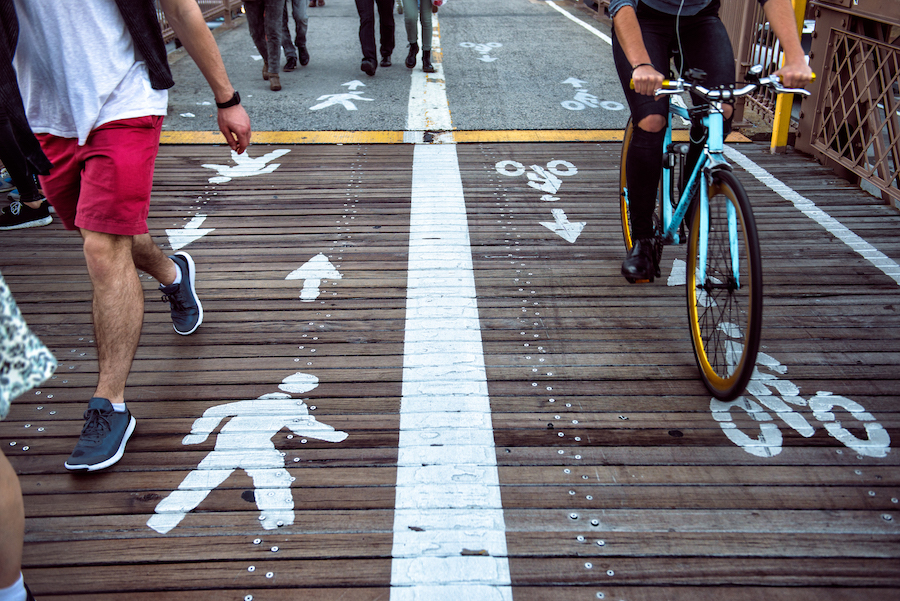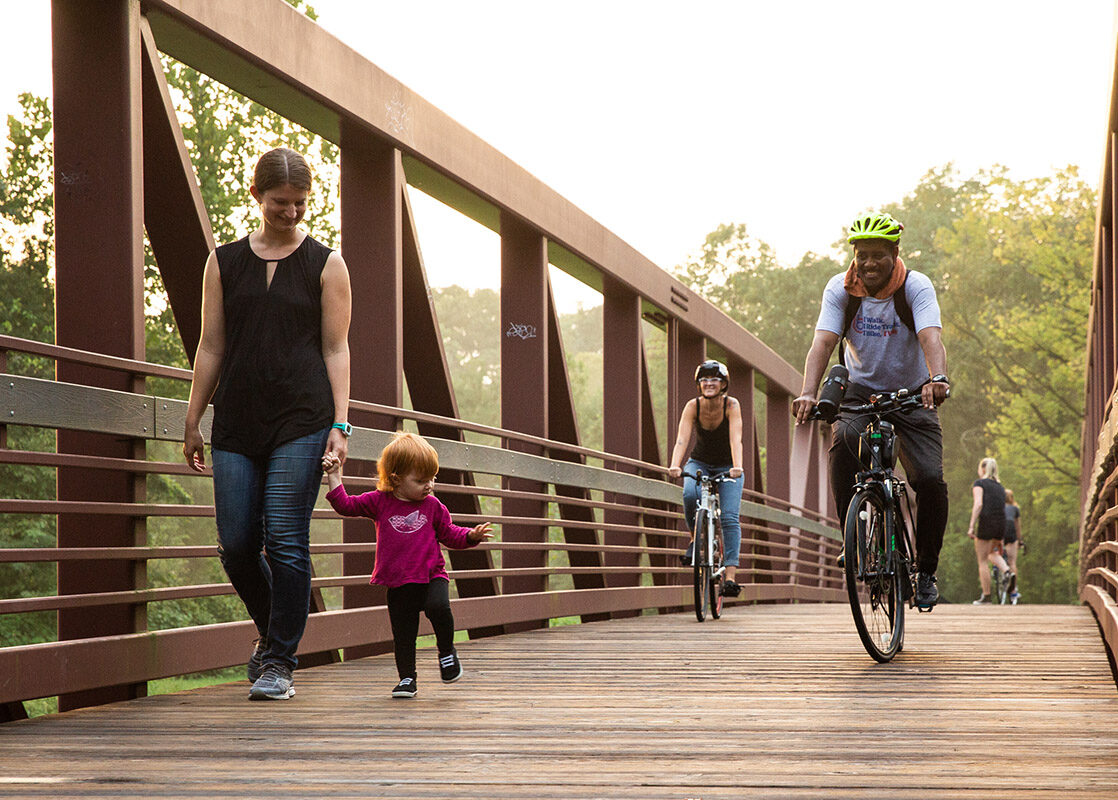Analysis: Bipartisan Infrastructure Bill Passes With New Opportunities for Trails, Walking and Biking

UPDATE: On Nov. 15, 2021, President Joe Biden signed the Infrastructure and Investment Jobs Act of 2021 into law.
The U.S. House of Representatives has passed the $1.2 trillion infrastructure bill, the bipartisan Infrastructure Investment and Jobs Act (IIJA) (H.R.3684), which passed the Senate in August. The bill will next head to President Biden for his signature, which is guaranteed. The House also made progress toward the passage of the Build Back Better Act (H.R.5376), which is politically linked to the infrastructure bill and would provide funds for infrastructure programs that include trails and active transportation as eligible uses.
Related: The Build Back Better Act Could Create New Opportunities for Trail and Active Transportation Funding
Included in the infrastructure bill is the five-year reauthorization of federal surface transportation programs, which contains $550 billion in new spending. While it is disappointing that this bill missed the opportunity to make transformative policy changes to create accountability for progress on climate, equity and mode shift, it does include advances in funding for trails, walking and biking that Rails-to-Trails Conservancy (RTC) has long championed, including increases in funding for active transportation, and the creation of a new program to connect the nation’s trail and active transportation system.
What Made It In, Plus Unfinished Business
This infrastructure bill authorizes nearly 70% more money for the legacy Transportation Alternatives Program (which includes the Recreational Trails Program) from $850 million to an average of $1.44 billion per year. This vital funding is less likely to be diverted to unrelated purposes as the new law constrains such transfers. Unfortunately, the Recreational Trails Program was not increased despite the growing need for the critical maintenance funding it provides. It was held stagnant at $84 million per year, where it has been since 2009. A long-anticipated Federal Highway Administration study of recreational fuel taxes used to fund the program shows that there is sufficient revenue to increase the program by nearly $200 million per year, but the study came out slightly too late to influence the Senate debate. Addressing this shortfall remains unfinished business.
RTC’s priority has been to couple these legacy funding sources with a new innovative policy that recognizes the need for larger, more concentrated federal grants to connect existing walking and biking facilities together into a system that makes it practical to get where you are going by bike or on foot. The new bill authorizes the Connecting America’s Active Transportation System Act (H.R.2991/S.684), now listed as the Active Transportation Infrastructure Investment Program, to receive $200 million per year. However, this funding is not dedicated, leaving the program’s future up to the appropriations process. Getting this program launched will be a key focus for RTC in the wake of this bill. It promises to transform communities by accelerating the creation of safe routes to everyday destinations and connecting communities to each other.
The bill also creates new competitive grant programs that benefit active transportation by increasing safety for all road users and reconnecting communities that face barriers to mobility. RTC also supported broader transportation reforms that were part of the bill passed by the House earlier this year but were not included in the final bill. Those climate and equity performance objectives could gain new life through the budget reconciliation bill currently being negotiated on Capitol Hill.
The advances in the infrastructure bill would not be possible without the support of you, our partners across the country that have fought alongside us to advocate for critical active-transportation infrastructure. There is still a long road ahead to ensure dedicated funding for two priority programs, but we want to take this moment to celebrate our hard-earned progress.
These programs will accelerate visionary plans set forth by our partners in their communities and states to create safe walking and biking routes to everyday destinations and advance long-distance connections, such as the Great American Rail-Trail™.
What About the Earmarks?
This spring, the House approved over $1 billion in active transportation earmarks as part of its transportation reauthorization bill, the INVEST in America Act. Unfortunately, these Member Designated Projects were not included in the final infrastructure bill. The Build Back Better Act includes several discretionary grant programs to be administered by the U.S. Department of Transportation that, if passed, could provide funding opportunities for those projects that applied for earmarks.
Although an earlier version of this bill did include a $6 billion investment in local projects, which might have been allocated to projects designated as priorities by individual members of Congress, this investment was removed from a version of the bill introduced in the House last week. The bill does still include investments in equity that include active-transportation connectivity grants as an explicit eligibility and a climate pot that could support local projects aimed at mode shift. RTC will monitor the creation and implementation of these grant programs closely and will provide updates and information to our partners in the Trail Expert Network as it becomes available.
What’s Next?

Going forward, RTC’s federal policy focus will be on three fronts, designed to maximize the funding and the opportunities available for trails and active transportation.
- Congress continues to work on finalizing the Build Back Better Act, which includes approximately an additional $43 billion in infrastructure spending. The bill currently includes a $4 billion equity pot for which active-transportation connectivity grants are explicitly eligible, as well as a $4 billion climate pot for which active transportation is eligible. RTC is working to ensure that transportation stays in the mix, and the equity and climate pots remain intact as the bill moves through the Senate, which may occur in the coming weeks.
- RTC will advocate for active-transportation connectivity grants and other priorities in the Fiscal Year 2023 budget process—a debate which will commence early in the new year.
- Implementation, implementation, implementation. The infrastructure bill charges USDOT with running several new discretionary grant programs of interest and to play a role in further defining new policies (e.g., safety). RTC will advocate for strong administrative guidance and criteria at USDOT to ensure the best possible results for active transportation given the legislation just passed. We also plan to work with you, our best partners, to ensure strong demand, with highly competitive proposals, for the new funding opportunities created by the bill.
While we’re pleased that the bipartisan infrastructure bill invests more in trails, walking and biking and begins to focus on climate, safety, jobs, and equity, we recognize that we still have our work cut out for us to ensure that active transportation connectivity and trail maintenance receive the critical dedicated funding needed to address high demand for safe and connected infrastructure that is in good repair. We will be vigilant in advocating for further reforms to ensure balanced transportation choices and strong implementation to ensure that good programs deliver great results.
The infrastructure bill is a launching point for all of us together to take our movement to the next level, accelerating a transition to an America in which everyone can safely and conveniently walk and bike for routine transportation and healthful recreation.
The Bipartisan Infrastructure Law includes some changes to familiar programs and adds new funding opportunities for trails and active transportation. RTC’s resources offer the latest information to assist in identifying appropriate potential federal funding opportunities for your trail and active transportation projects and taking the necessary actions to successfully apply for these opportunities.

Donate
Everyone deserves access to safe ways to walk, bike, and be active outdoors.
